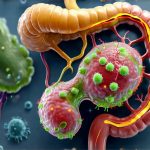Smoking remains a significant public health concern worldwide, despite decades of awareness regarding its detrimental effects on respiratory and cardiovascular systems. Beyond these well-established links, emerging research is increasingly highlighting the profound impact smoking has on seemingly distant parts of the body – specifically, the gut microbiota. This complex ecosystem within our digestive tract plays a crucial role in overall health, influencing everything from immune function to mental wellbeing, and it’s now becoming clear that tobacco use can significantly disrupt its delicate balance.
The composition and functionality of the gut microbiome are influenced by numerous factors including diet, genetics, age, and environmental exposures. However, recent studies demonstrate a compelling relationship between smoking status and alterations in microbial communities. Understanding this interplay is vital not only for comprehending the broader health consequences of smoking but also for developing targeted interventions to mitigate its effects and support overall wellbeing.
Smoking & Microbial Dysbiosis
Smoking introduces numerous toxins into the body, and these compounds aren’t limited to affecting the lungs. They are absorbed into the bloodstream and can interact directly with the gut environment, leading to shifts in microbial populations. This disruption, known as dysbiosis, is characterized by a reduction in beneficial bacteria and an increase in potentially harmful ones, impacting the overall health of the gut ecosystem.
These alterations aren’t simply correlational; evidence suggests smoking actively causes these changes, rather than individuals who smoke also having pre-existing differences in their microbiome. The mechanisms behind this are complex and still being investigated but involve direct toxic effects on microbes, altered gut motility, and impacts on immune responses within the digestive system.
Consequences of Altered Gut Microbiota
A disrupted gut microbiota has far-reaching consequences for health beyond just digestive issues. It can impact nutrient absorption, weaken the immune system, increase inflammation throughout the body, and even influence mental health through the gut-brain axis. The specific changes induced by smoking have been linked to a higher risk of various conditions.
Impact on Immune Function
The gut microbiome is intrinsically linked to the development and regulation of the immune system. Smoking-induced dysbiosis can impair immune cell function and reduce the diversity of immune responses, making individuals more susceptible to infections and autoimmune diseases. Specifically, reduced populations of bacteria that produce short-chain fatty acids (SCFAs), critical for immune modulation, have been observed in smokers. These SCFAs strengthen the gut barrier and influence immune cell activity.
Reduced microbial diversity also compromises the ability of the gut microbiome to effectively compete with pathogens, increasing vulnerability to harmful bacteria and viruses. The chronic inflammation often associated with smoking further exacerbates this issue by disrupting immune homeostasis within the gut.
Changes in Microbial Diversity & Composition
Smokers consistently exhibit lower overall microbial diversity compared to non-smokers. This loss of diversity is a hallmark of an unhealthy gut microbiome and reduces its resilience to environmental stressors. Specific bacterial groups are also consistently affected; studies have shown decreased abundance of Faecalibacterium prausnitzii, a key butyrate producer with anti-inflammatory properties, and increased populations of potentially pathogenic bacteria like Clostridium difficile.
The specific changes observed can vary based on factors such as the duration and intensity of smoking, individual genetic predisposition, and dietary habits. However, the overall trend points towards a less diverse and more pro-inflammatory microbial community in smokers.
Gut Permeability & Inflammation
Smoking increases gut permeability – often referred to as “leaky gut” – allowing bacterial products and toxins to enter the bloodstream. This triggers systemic inflammation, contributing to various health problems including cardiovascular disease, metabolic disorders, and even certain cancers. The disruption of the mucus layer protecting the intestinal lining is thought to be a key factor in increased permeability caused by smoking-induced changes to the microbiome.
The altered microbial composition itself contributes to this process; an imbalance favoring pro-inflammatory bacteria increases production of compounds that damage the gut barrier and promote inflammation. This creates a vicious cycle where dysbiosis leads to increased permeability, which further exacerbates dysbiosis.
Ultimately, understanding the complex relationship between smoking and the gut microbiome is crucial for developing comprehensive strategies to mitigate the health risks associated with tobacco use. Further research is needed to fully elucidate the mechanisms involved and identify potential interventions – such as dietary modifications or targeted probiotic therapies – that can restore microbial balance and improve overall health in smokers.


















